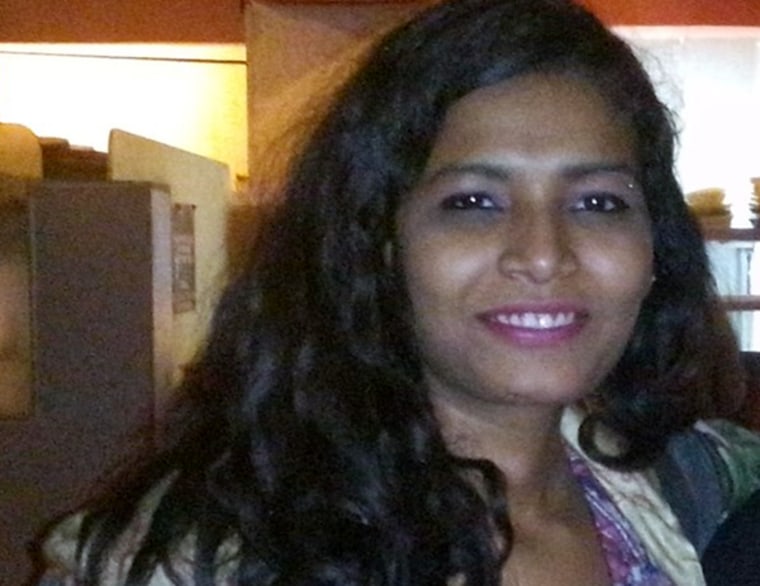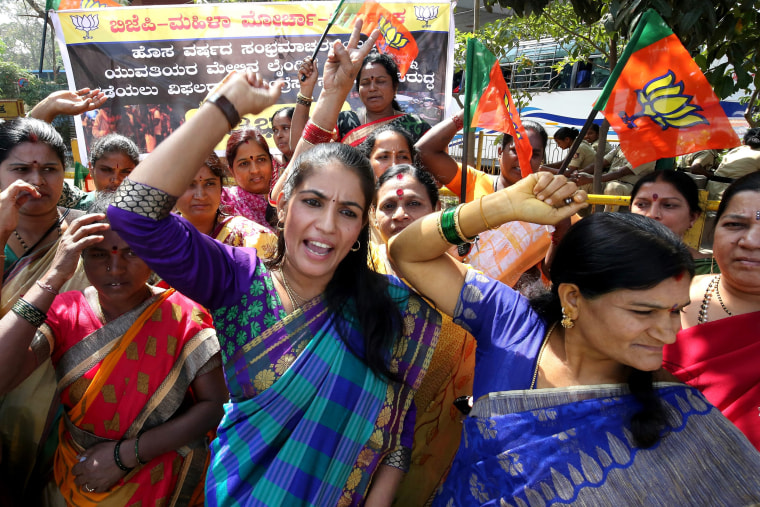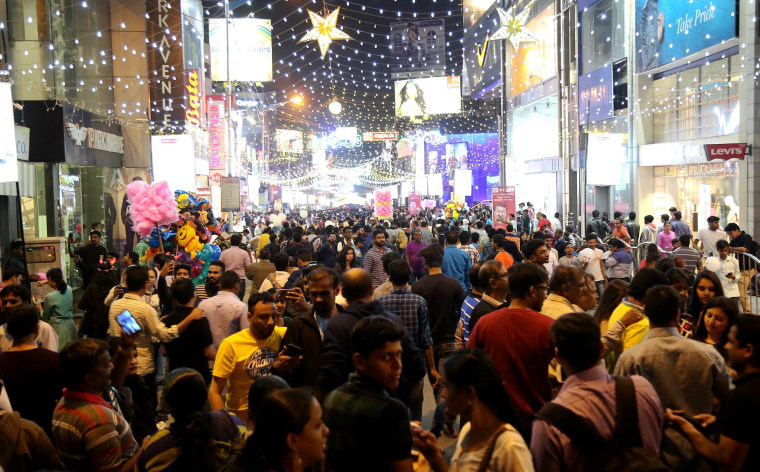A movement is building and a multi-city march in India is now being planned for later this month to raise awareness about violence against women in the country after reports of a spate of assaults on women in Bangalore on New Year's Eve.
The specifics of the New Year's Eve event are still being investigated, and it is unclear exactly how many women were assaulted, but at least four men have so far been arrested, and witnesses and various local news outlets said "several" women and young girls were subject to harassment — with some comparing it to an incident in Germany on New Year's Eve 2015, when dozens of women were targeted by roving packs of men.
"I was going home and there were two random guys walking down the street, and one grabbed me and I went into shock," Chaitali Wasnik, a freelance photographer in Bangalore who was covering celebrations, told NBC News.

"I started beating him and punching him, and about 10 to 15 men tried to hold me back, and the guy just ran away," Wasnik said.
Wasnik said it was the first time she's ever been assaulted and "I went in complete shock. I went completely blank," she said. Wasnik wrote a public Facebook post after returning home and shared her story of assault, but has since changed her privacy settings after receiving messages from people harassing her, she said.
Other victims also reported being surrounded by large groups of men who groped and assaulted them. The Bangalore Mirror called New Year's incidents "a brazen, mass molestation of women."

Then, to add insult to injury, local officials' initial response blamed the victims.
G. Parameshwara, the home minister of Karnataka state, where Bangalore is located, blamed the purported assaults on the women's "western" clothing. These young people "try to copy westerners not only in mindset, but even the dressing." he said according to several news outlets.
“Partying late night in half attire, blindly following western culture, has never been our culture,” said Abu Azmi, another local politician and party leader.
That led to more outrage online, both from regular Indians and celebrities.
"Senseless people comment on women’s clothes," tweeted Anushka Sharma, an Indian actress and model.
"The Bangalore incident makes me feel we are evolving backwards," Akshay Kumar, an Indian actor, tweeted. "Truly shameful."
“It’s important for women to speak about these cases,” activist Japleen Pasricha told NBC News.
Pasricha is the founder of the group "Feminism in India" and is helping plan the march on January 21.
The public outcry over these assaults turned into an online campaign using the hashtag #YesAllWomen — which first spawned in the U.S. in 2014 — to share their stories of assaults from the past and present.
Pasricha said she grew disheartened after seeing the hashtag #NotAllMen on Twitter in response to the Bangalore attacks because she felt that the attention should be placed on the women instead of on men who had nothing to do with it. She decided to resurface the hashtag #YesAllWomen that originally appeared in the U.S. to counter that viewpoint.
"I was 13 at a festival in my village," one woman Pooja Sridhar tweeted. "My mom, sister, grandma and I all had our butts pinched as we walked home."
The online movement, in turn, instigated the gathering in Bangalore which will coincide with the Women's March on Washington the day after U.S. President-elect Donald Trump's inauguration.
So far, only four men have been arrested in connection to an incident that was captured by a surveillance camera and went viral. The Bangalore Mirror reported that Parameshwara has now decided to install 550 CCTV cameras throughout the city in response to the allegations.
In fact, Parameshwara, who had first invoked the victims sartorial choices, days later changed his tune to condemn the attacks, and said "Incidents like the one that happened on New Year must not bring bad name to Bangalore," according to the Bangalore Mirror.
“It’s not about just identifying four people. It is also a social systemic problem."
Many noted that the official responses to rape and sexual assault in India has traditionally been appalling — ranging from ignoring the victims to blaming them.
Less than five years ago, India was rocked by a widely reported sexual assault story that took the country by storm. It involved a 23-year-old woman in New Delhi who was raped and beaten by a group of men on a public bus in December 2012 and later died.
“The conversation around sexual assault changed after the New Delhi incident. Now, more people are talking about their experiences in more ways," said Satish Kolluri, an associate professor of communications studies at Pace University in New York City who studies South-Asian culture. "In one sense, it has done good. Police are forced to take action.”
And it seems that more rapes are now being reported and recorded.
The National Crime Records Bureau in India shows that 34,651 rapes were reported in 2015 — compared to 2012, that’s a 39 percent increase.
“Given the population of over a billion people in India proportionally to that figure, you might not think that’s a huge number. It’s still a big concern for everybody,” Kolluri said. “A lot of it has to do with reporting and policing.”
“It’s not about just identifying four people,” Kolluri said. “It is also a social systemic problem. What happened to those who escaped?”
The Bangalore investigation is still ongoing, and police believe many women have yet to come forward, according to the Bangalore Mirror.
"The victim doesn’t report for various reasons like victim blaming," said Shruti Kapoor, founder of Sayfty, an organization that educates Indian women and girls about how they can counter violence. "That’s one of the reasons why these perpetrators get away with what they do.'
For victims like Wasnik, there needs to be a change in perception.
"There are a lot of girls who don’t come out and report this because usually they’re afraid or scared from their family or from society," Wasnik said.

